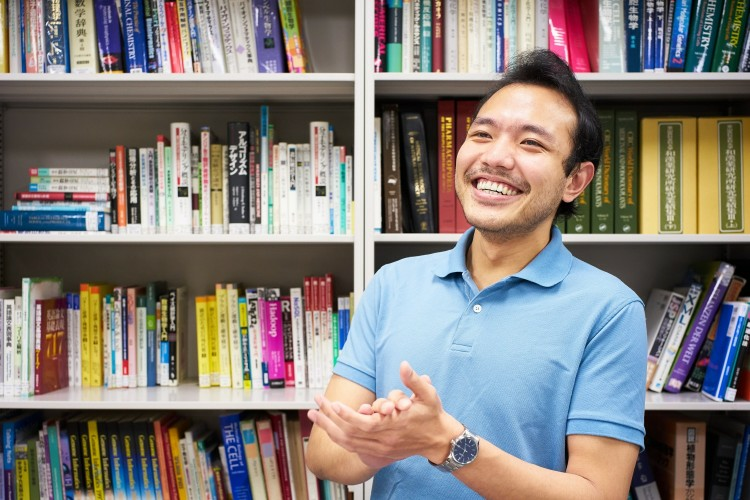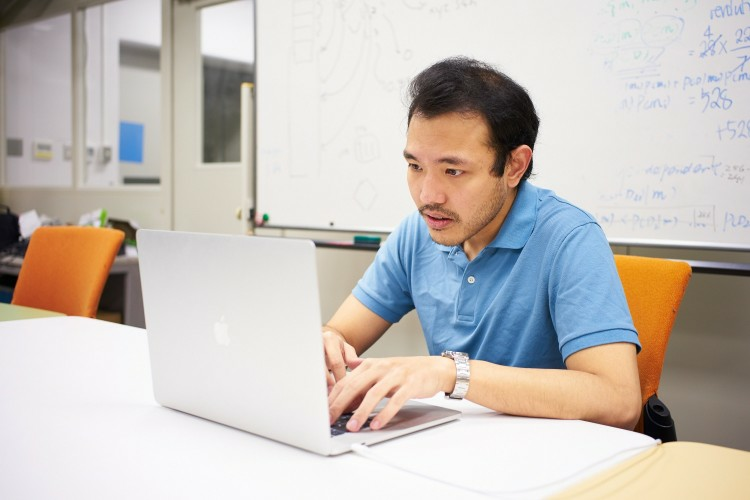Article
How Data Might Save Us
 March 24, 2019
March 24, 2019
Juan Carlo Mallari needs only two words to describe his field of research. “Computational Biology,” he says, which is easy enough to say. But understanding it might take a little more time and brainpower from us non-scientists.
Since October 2017, Mallari has worked with a multidisciplinary team—including computer scientists and biologists—some of whom specialize in cancer research. In the simplest possible terms, his job is to make their jobs a little easier, and a little more precise.
Using his math background, he helps researchers better understand gene networks and how genes express themselves in our bodies. What are the exact parameters through which a child develops blue eyes, and not brown? What perfect storm of genetics births a top class athlete? This can be extrapolated. Eventually, the question can be—from a sample of cells—whether or not a person has a particular condition or disease. One simple application of this has significant implications on the world-at-large: diagnosing cancer.
This process, however, is still being refined. And data plays a big part.
“With gene networks—you need to test all possible connections among the genes,” says Mallari. “What we do is—we give biologists a shortlist of the connections worth looking into, which they will then verify with actual biological experiments. With data, what used to be a relatively blind process is more narrowed down.”
It’s not uncommon to hear brave proclamations from the young people of today. Their ambition is infectious. High schoolers are unafraid of claiming they want to be in the NBA, or to become President, or to cure cancer.
Mallari was not one of those kids, but somehow he’s working in a major laboratory, performing an arguably noble task: helping cure cancer. How exactly does something like this happen? And could it be a blueprint for Filipinos who want to get into the field of cancer research?
Research wasn’t the dream for Mallari, at least not originally.
“Nung pumasok ako dito, that’s when I discovered na ito na ‘yung career path ko,” says Mallari, a former teacher in Ateneo de Manila University. “Nung nagtuturo ako, may allergy ako sa research. I honestly didn’t feel like I could create knowledge. I knew I had the capacity to understand knowledge, pero nakakatakot lang na gagawa ka ng [knowledge] na gagamitin ng ibang tao.”
“Iba lang talaga siguro ‘yung environment dito [sa Nara]. Everyone tries all sorts of things. Then you see the models they create, and you realize that it’s not really about making things so complex; it’s about finding simple solutions.”
Mallari, however, has advice for young people who do want to get into research.
“Parte na ngayon ng curriculum ang research ‘di ba?” says Mallari. “That’s the first opportunity they can take advantage of. Find a topic, and figure out if they’re really serious about it.”
“One thing they have to understand is—in research—you have to be disciplined and self-motivated. You have to do more than what’s asked of you. I think early on, kung gusto mong mag-lab work talaga, kailangan mag-focus ka na sa discipline and self-motivation.”
He isn’t joking about discipline or self-motivation. That might be the one thing that’s always true about the real world—you have to choose to initiate things; no one will do it for you. If you allow yourself to be stuck in your own circumstances, then you’ll be stuck there forever.
“Nung pumasok ako dito, machine learning and gene expression analysis were new to me,” says Mallari. “And since doctoral course ito, hindi ka binibigyan ng structure. I don’t attend classes anymore. It’s purely research. So I had to create my own educational program and structure my own learning. Buti na lang meron akong teaching experience, at ginawan ko ng syllabus ‘yung sarili ko. There were times when I didn’t know if kaya ko bang intindihin ‘yung dapat intindihin. There were so many mathematical models. Pero talagang perseverance lang.”
Some of the advice he gives—while meant for aspiring researchers—strikes a nerve with aspirants of any sort, including corporate workers who may deal with the occasional bout of impostor syndrome.
“Bago ako mag-start ng PhD, talagang self-doubt ‘yung nangibabaw,” he says. “Talagang insecurity. Meron ako laging binabalikan na sinabi sa akin ng senior faculty. Ang sabi niya: ‘While pursuing your doctorate, you will only feel bad if you are not actually doing your research. Magiging insecure ka lang kung hindi ka busy—pag hindi mo ginagawa ‘yung dapat mong ginagawa’.”
Which is fantastic advice for all of us. There are days when we feel like frauds; there are days when we might doubt whether or not we deserve. But who better than Mallari to remind us that, when things seem intimidating or impossible, we can cure it with hard work?
While Mallari is doing interesting research in a unique field, he still can’t avoid the common question asked of most Filipinos who have succeeded abroad. Is his field of expertise something we can develop in the Philippines? Or is it the wrong approach to keep wanting to transplant a progressive initiative abroad into the Philippine context?
“The Philippines needs to establish a niche,” says Mallari. “Hindi tayo makakalaban sa industrialized nations when it comes to genomics or other advanced and esoteric fields. Hindi tayo sasali sa karera na andun na. Gagawa tayo ng sariling karera.”
“I think I can give an example,” he continues. “Mathematical models are usually about having the correct parameters. You want to find the correct parameters for the equation, and there are many different algorithms for finding those. Sa Philippines, isa sa mga subfield na medyo involved tayo is animal behavior related algorithms—bat algorithms. Siguro related na rin sa rich biodiversity natin. That’s one example.”
“Sa field ko—computational biology—sobrang laki ng opportunity,” says Mallari. “Hindi ko masyadong alam ‘yung sa ibang university, pero alam ko sa Ateneo and U.P. may mga bagong data science courses. But while I think mas related sa corporate applications ‘yung data science ng Ateneo and U.P., essentially, data science rin naman ang ginagawa ko, e.”
But Mallari also has a more general—and perhaps more ambitious—wish for the Philippines—for us to be a little more data-driven in our decision making.
“When people make decisions, even nowadays, masyadong driven by anecdotes and by ‘feel’,” he says. “It’s inappropriate for a time when we have so much available technology and statistics.”
“If you’re pushing for a particular policy, you can’t just base it off the experience of one person,” he continues. “It’s not about reducing people to statistics. It’s just the best way of showing people the larger picture. Kulang ng quantitative focus ang general decision making sa Pilipinas. And it’s not just in policy. We should encourage people to explore other applications of data science—to go beyond biology. It could be disaster risk, or in establishing an energy mix. There’s just so many applications.”

Of course, while being an accomplished researcher, Mallari is also a relatively youthful guy. Toward the end of the conversation, he provides an example that does not just push forward an advocacy with astounding clarity, but also reveals his youth and wisdom.
“I remember one time, naglalaro kami ng Pokemon,” he says. “Sa Pokemon kasi, kailangan mo pumili ng attack na gagawin—and naka-base ‘yung attacks sa random number generator. Madalas, I guess, ‘yung ibang players kasi feeling nila malakas ‘yung move na ‘to, so ‘yun ‘yung pinipili nila. But you can actually maximize the probability of doing the most damage. Sabi ng kaibigan ko: ‘Ito ‘yung pipiliin kong move, kasi ito ‘yung pinakamataas na probability na may magagawa’.”
“Maganda siguro kung ‘yung decision making natin sa Pokemon, nadadala natin sa totoong buhay.”







